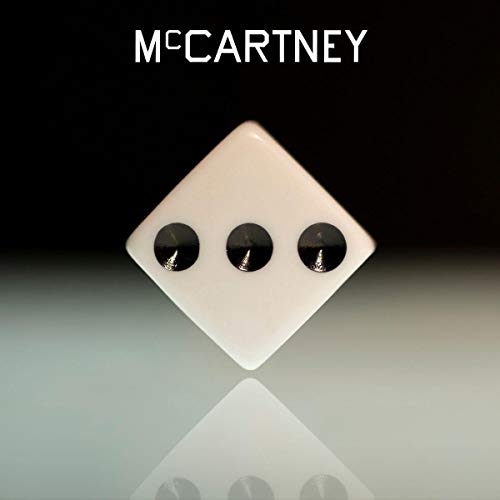
Paul McCartney
McCartney III
Release Date: Dec 18, 2020
Genre(s): Pop/Rock
Record label: Capitol
Music Critic Score
How the Music Critic Score works
Buy McCartney III from Amazon
Album Review: McCartney III by Paul McCartney
Excellent, Based on 8 Critics
Based on rating 9/10
Like its predecessors McCartney (1970) and McCartney II (1980), McCartney III was written, recorded and produced entirely by Sir Paul McCartney -- this time, created alone during a COVID-19 lockdown. It is with McCartney III that one of the world's most celebrated songwriters has completed his trifecta of ultimate solo albums, proving yet again his legacy as a musical virtuoso. From the very beginning, it's clear that this album is going to highlight McCartney's abilities as a composer. He's not concerning himself with writing any more hits; instead, he has chosen to display his talent and love for the instruments that have carried his career for over 60 years.
Based on rating 4/5
There's something inherently pleasing when the all-time greats acknowledge a sense of their own legacy and mythology; Bowie was a master of it in later life, and there's an undoubted feeling of circles completed and patchworks pieced together with the arrival of 'McCartney III'. The legendary Beatle's first self-titled album landed in 1970 as a largely-acoustic solo affair; 1980 brought with it its follow-up, complete with the playful eccentricities of cult favourite 'Temporary Secretary'; now, 50 years after the original, Macca begins another decade with its third outing - also written and recorded entirely on his own during lockdown, and featuring the kind of easy warmth that made its predecessors so full of charm. As with any great McCartney offering, 'III' mixes a wholesomeness and heart-tugging purity with still-unexpected moments of musical intrigue - sometimes on the same track, as with 'Find My Way', which putters along merrily before breaking into a curveball middle-eight.
Based on rating 8
There has been an ever so slight shift in the Macca narrative in the past few years. The image of the slightly cheesy uncle has made way for the real story - of the only Beatle who immersed himself in the London Avant-garde scene whilst all the others absconded to the shires; the lo-fi self-recorder years before it was fashionable, the megastar who took his new band on the university circuit, the one who embraced the electro scene of the early 80s with gusto. The way this frames 'McCartney III', the latest unintentional instalment in his self-recording trilogy, cannot be underestimated.
Based on rating 8/10
Paul McCartney faced the COVID-19 lockdown of 2020 like he faced so many other unexpected challenges in his life: he set out to make music on his own. The title of McCartney III positions it as a direct sequel to 1970's McCartney and 1980's McCartney II, albums he made in the wake of the respective dissolutions of the Beatles and Wings, a sentiment that rings true in some ways but not in others. Certainly, the one-man-band approach unites all three albums, as does their arrival at the dawn of a new decade, yet McCartney III doesn't contain a clear undercurrent of Paul processing change in the wake of loss.
Based on rating 4
McCartney III, the latest in Paul McCartney‘s self-titled album series that spans 50 years, was created by the former Beatle alone at home is in many ways your archetypal lockdown album. It comes on the back of 1970’s McCartney I and 1980’s McCartney II and very much maintains the liberated, set-apart spirit that defined those records. McCartney plays all instruments on the album which sees him pursue various musical tangents, all of which are informed by a sense of relaxed playfulness.
Based on rating 7.5/10
And so, while it may not have the immediate stickiness of McCartney's other two self-titled efforts, McCartney III is nevertheless a worthy addition to his expansive and legendary catalogue. It's catchy, well-crafted, and creative, all while remaining honest. It may not be the groundbreaking production that McCartney has, at times, produced with valiance and majesty, but it just works.
Based on rating 7.2/10
There are many Paul McCartney albums, but only a precious few get to call themselves McCartney albums. McCartney III is the surprise third entry in a series that began with his 1970 solo debut McCartney and seemed to end with 1980's McCartney II, two dramatically different records born of dramatically different circumstances that were nonetheless united by a DIY methodology. Unlike the other records in Macca's solo discography, these were true one-man-band efforts, clearinghouses for the rough song sketches and home-recording experiments he'd never bring to his proper releases.
Opinion: Great
The Lowdown: Paul McCartney understands the value of a one-man band. At various points across his eight decades in music, the pop legend has put collaboration on hold to focus on albums written, produced, performed, and recorded by himself alone. The first of these (1970's homespun McCartney and 1980's synthed-out McCartney II) were dismissed upon release only to find themselves declared seminal in later decades; both records are now rightly praised by later listeners for their affirming impact on generations of lo-fi and bedroom pop weirdos.
'McCartney III'
is available now

